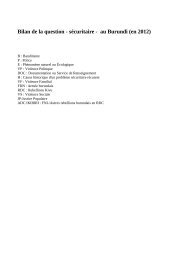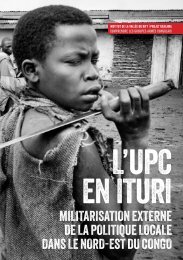Create successful ePaper yourself
Turn your PDF publications into a flip-book with our unique Google optimized e-Paper software.
AYMENN AL TAMIMI<br />
was destroyed, however, in June 2015 by the Mujahedin Shura Council of<br />
Darnah and Its Suburbs, which is linked to al-Qaeda; and since then, IS has<br />
been unable to reclaim a foothold in the city.<br />
Further out to the west, IS has been able to consolidate territory on the<br />
Mediterranean coastline based around the city of Sirte, which, unlike Darnah,<br />
is a true stronghold of IS, falling under its Wilayat Tarabulus (Tripoli<br />
province), while the easternmost towns on that stretch of territory are defined<br />
as part of Cyrenaica province. In part, the dominance of IS in the Sirte area<br />
originated in the defection to it of local Libya Ansar al-Sharia networks that<br />
had already been involved heavily in governance, going as far back as June<br />
2013.<br />
Considerable documentary evidence points to a sophisticated governance<br />
system in the Sirte area along the lines of what is observed in Syria and Iraq,<br />
including a functioning judiciary (Diwan al-Qada wa al-Mazalim) that deals<br />
with matters ranging from marriage contracts to real estate; an Islamic police<br />
force; a Dawa and Masajid branch responsible for outreach to the population<br />
and control of the affairs of the mosques; repentance programs and sharia<br />
sessions as part of a cooptation of local personnel structures; conciliation initiatives;<br />
and the introduction of the zakat taxation system (falling under the<br />
Diwan al-Zakat wa al-Sadaqat). The Sirte area, therefore, represents the most<br />
developed IS governance project outside of Iraq and Syria; it is thus hardly<br />
surprising that Adnani mentioned the city alongside Mosul and Raqqa<br />
in a speech released in late May 2016 that partly attempted to hit back at<br />
the coalition’s claims of progress against IS on account of territorial losses.<br />
Indeed, IS control of the Sirte area is coming into doubt in the face of rival<br />
local forces beginning to direct their efforts against it.<br />
Elsewhere in Libya, IS has found itself a military combatant in Benghazi<br />
against forces loyal to Khalifa al-Haftar, while a more covert presence was<br />
maintained in Sabratha, to the west of Tripoli city, as part of the running of<br />
a suspected training camp for militants, only to be targeted by U.S. airstrikes<br />
in February 2016. Meanwhile, the Fezzan province that represents Libya’s<br />
third major region has shown no sign of governance projects, and, as with<br />
Algeria province, information has been very sporadic.<br />
In short, IS’s ability to realize governance (tamkin) has been very limited<br />
thus far in the wider region beyond Iraq and Syria—an observation that has<br />
implications for IS’s credibility on the global stage, particularly in appealing<br />
for support from the wider jihadist movement. Since IS puts such great<br />
emphasis on being a state, the lack of success in replicating elsewhere its<br />
34






